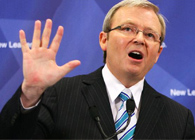The ACT Labor Government has reportedly been forced to dump plans to legally recognise same-sex civil union ceremonies after the Federal Government refused to support the planned laws, according to media reports.

Following Prime Minister Kevin Rudd's threat to use Commonwealth powers - as the former PM had done - to override laws that will legally recognise same-sex civil union ceremonies should they be passed by the ACT Legislative Assembly, the self-governing territory will now move to legalise civil partnerships (without ceremony).
"On these matters, state and territories are answerable to their own jurisdictions. State and territory governments are elected to govern, they are accountable to their constituents," PM Rudd said then.
The federal government says it believes such ceremonies would mimic marriage and therefore undermine the Marriage Act.
ACT Attorney-General Simon Corbell, who was advised by the Federal government that it would override the laws if passed by the ACT Legislative Assembly, read the statement for not supporting the proposed laws as pandering to the "extreme Christian Right."
He told ABC Radio: "My view of that is they have been beholden to the extreme right of the Christian lobby in Australia.
"They feel that it's more important to satisfy their views than accept that the ACT is self-governing and has the right to make these laws for itself."
Describing the Rudd Government's position as "hypocritical" and "appalling," ACT's Chief Minister Jon Stanhope disagreed that allowing gay couples to be married would diminish heterosexual marriages.
"I don't believe for one minute that by recognising gay and lesbian relationships under the law, we are in any way diminishing marriage," he told the The Canberra Times. "It's my 36th wedding anniversary tomorrow. Recognising the loving relationship of [Labor MLA] Andrew Barr does not diminish my marriage one iota and I challenge anybody to suggest it does."
A leading gay rights group said the federal government had failed to give a clear explanation for its strident opposition to same-sex marriage except to say marriage was traditionally between a man and a woman.
"Well, traditionally there was slavery and traditionally women didn't have the vote. But just because that was the tradition doesn't mean that change couldn't occur," Australian Coalition for Equality spokesman Rodney Croome told ABC Radio.
Following the Federal government's move, Corbell said that the self-governing territory will now move to legalise civil partnerships (without ceremony) so that children being raised by gay couples would be considered dependents of both adults for tax and unemployment benefits, and same-sex couples would be treated as a family unit for tax, welfare and pension purposes.
In April, the Australian federal government announced plans to amend about 100 federal laws to remove discrimination against same-sex couples. The proposed legislation, which is expected to be implemented by mid-2009, will not recognise same-sex marriages.
Only same-sex couples in the states of Victoria and Tasmania have access to some rights as conventionally married heterosexual couples by proving that a relationship exists through a registry. In other states, same-sex and de facto couples often must go to court to prove a relationship exists to access rights accorded to them under the law.
